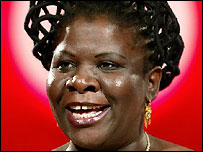 The Anti Corruption Internet Database (ACID) is a project of WANGONET founded by Tunji Lardner, it is "...an on-line facility set up to help Nigerian citizens monitor the performance, accountability and transparency of their government and government officials.This website is part of a multi-media outreach campaign which aims to Educate Nigerians on the systems and processes that exist for the budgeting and accounting of public funds, Inform the public on government’s efforts and shortfalls in managing these vast funds and Empower all citizens to demand their basic rights to see these funds spent on their needs..."
The Anti Corruption Internet Database (ACID) is a project of WANGONET founded by Tunji Lardner, it is "...an on-line facility set up to help Nigerian citizens monitor the performance, accountability and transparency of their government and government officials.This website is part of a multi-media outreach campaign which aims to Educate Nigerians on the systems and processes that exist for the budgeting and accounting of public funds, Inform the public on government’s efforts and shortfalls in managing these vast funds and Empower all citizens to demand their basic rights to see these funds spent on their needs..."
Anti Corruption Internet Database
Renewables in Africa
Karekezi, S "...surveys (PDF) the dissemination of renewable technologies in Sub-Saharan Africa...and attempts to evaluate the potential for these technologies to meet the energy needs of Africa’s poor..."
In contrast to the industrialized world which is worried by the long-term global environmental impact of current patterns of energy production and use,African countries are largely pre-occupied with the immediate problems of reversing the persistent decline of their centralized power systems as well a meeting the longstanding and pressing demands for a minimum level of modern energy services for the majority of their poor - many of whom have no electricity and continue to rely on inefficient and environmentally hazardous unprocessed biomass fuels...At the institutional level, African countries needs to realize that the centralized energy model is becoming increasingly obsolete in developed countries where independent power producers riding on the back of the privatisation wave are increasingly the norm rather than the exception. Rather than continue to expand its centralized power systems, African countries should begin to develop a decentralized energy structure which would better match its current capital resources and management capability as well as position it well to adapt to future energy technologies and systems.
Luísa Dias Diogo
 Mozambiques first female prime minister Luisa Dias Diogo ,another one of Africa's emerging leaders "...has consistently used her contagious passion for Mozambique to drive real economic change and has become an outspoken advocate of transparency, accountability and good governance in a region that has long been victimized by corruption. Her achievements are increasingly attracting global attention...",TIME.
Mozambiques first female prime minister Luisa Dias Diogo ,another one of Africa's emerging leaders "...has consistently used her contagious passion for Mozambique to drive real economic change and has become an outspoken advocate of transparency, accountability and good governance in a region that has long been victimized by corruption. Her achievements are increasingly attracting global attention...",TIME.
photo courtesy of the BBC
Building A Sustainable Mortgage Market
Frank Gyamfi-Yeboah &Nicholas Addai Boamah write about strengthening the mortgage market:
The main aim of a housing finance system is to provide funds to the producers and purchasers of housing both rental and owner-occupied. This simple description has spawned a broad array of institutional arrangements, ranging from contractual savings scheme, to depository institutions specializing in mortgage finance, to the issuance, sale and trading of mortgage securities. All of these arrangements have been created with the same purpose in mind, to channel funds from savers to borrowers. As economies develop, provision of housing finance often moves away from extensive reliance on special circuits towards integration of housing finance into broader financial markets. As populations continue to grow and urbanization accelerates, the necessity of providing adequate housing also mounts.via GhanaWeb
African Women are Ready to Lead
A growing proportion of women are breaking through the glass ceiling. Women who have entered into leadership positions attribute their success to factors such as access to education and work opportunities, good mentoring by both men and women, support from family, employers, supervisors, teachers and colleagues, and successful lobbying by gender activists
Elites Misunderstand the Meaning of Progress
Africa has seen all kinds of development paradigms that have never fully factored in her rich values and experiences, unlike places like Japan, South Korea, and Malaysia. Why should Africa be made to go through all these non-African-created development paradigms? Because the Western world thought that Africans are not developed, or more appropriately, not "civilized," and that they could replicate their values and experiences in Africa in their self-imposed "civilizing mission." They did this without factoring in Africa's values and experiences because they wanted to play God by re-creating Africans in their development image...Still, in terms of Africa's development progress, almost all the foreign development paradigms are not bad. The problems have been how to mix Africa's environment with these development paradigms so as to facilitate a better sustainable development, as advocates of the modernization theory say. This inability of African elites to creatively mix their values and experiences with their colonial legacies and the enabling aspects of the global development values, have not only seen Western governments continue largely with the modernization theory but also international development agencies' programs that come in the form of foreign development aid.
African Business Flickers Even More
 The Economist writes about the challenges and increasingly promising rewards of business in Africa:
The Economist writes about the challenges and increasingly promising rewards of business in Africa:
This week an annual World Bank study once again named Africa as the most difficult region in which to do business. But not everyone sees it like that. Graham Mackay, who runs SABMiller, the world's second-largest brewer, has said that “if there was any more of Africa, we'd be investing in it.”...the reward for coping with the risk and the hassle come in large returns and a lack of competition. Successful businesses can expect to enjoy comfortable margins, rewarding them for their time and investment. SABMiller's best operating margins are in Africa; MTN's are over 42%...Successful investors say that Africa can be no harder than other emerging markets, but that doing business requires good local knowledge.
photo courtesy of the Economist
Integrated Diamond Management
 "...The basic tenet of Integrated Diamond Management is that the incentive structure must be changed if we are to ever hope to curb diamond smuggling that can support conflict and money laundering. The “stick” of external regulation and enforcement in the artisanal diamond sector in countries with severely limited government resources, such as Sierra Leone, simply cannot succeed without strong community and investor commitment to responsible diamond management. Conversely, by empowering locals to control many of the key diamond management decisions, and by dramatically increasing the economic benefits that accrue to local communities from “clean” mining and marketing, we create the incentives necessary to stem the flow of smuggled diamond value..."
"...The basic tenet of Integrated Diamond Management is that the incentive structure must be changed if we are to ever hope to curb diamond smuggling that can support conflict and money laundering. The “stick” of external regulation and enforcement in the artisanal diamond sector in countries with severely limited government resources, such as Sierra Leone, simply cannot succeed without strong community and investor commitment to responsible diamond management. Conversely, by empowering locals to control many of the key diamond management decisions, and by dramatically increasing the economic benefits that accrue to local communities from “clean” mining and marketing, we create the incentives necessary to stem the flow of smuggled diamond value..."
Reforming African Institutions
Gumisai Mutume writes about the progress being made in reforming institutions throughout the continent:
While repressive governments are yet to be eliminated across the continent, significant change is taking place in a growing number of countries. Civil society is growing and applying pressure for better performance, the media are demanding transparency across all sectors of society and governments are realizing that the days of coercive politics are numbered...In a growing number of countries, citizens are calling for independent judges, effective parliaments, measures that address corruption and the devolution of power from central to local governments. "It is expected that proposed laws will be subject to public dialogue and debate before enactment and that those representing the people will regularly consult and seek the people's views,",Ellen Johnson Sirleaf. In a nutshell, Africans are demanding what is known among development practitioners as "good governance."...Narrowly defined, governance means the exercise of political power to manage the affairs of state. In a broader sense, it can refer to the various processes relating to leadership, such as policymaking, transparency, accountability, the protection of human rights and the relationship among the public, private and civil sectors in determining how power is exercised.
Manufacturing's Rise: The India Story
The New York Times reports:
For decades, India followed a route to economic development strikingly different from that of countries like Japan, South Korea or China. While its Asian rivals placed their bets on manufacturing and exports, India focused on its domestic economy and grew more slowly with an emphasis on services. But all that is starting to change.
India’s annual growth in manufacturing output, at 9 percent and accelerating, is close to catching growth in services, at 10 percent. Exports of manufactured goods to the United States are now rising faster in percentage terms than China’s, although from a much smaller base. More than two-thirds of foreign investment in the last year has gone into manufacturing in India, not services.






